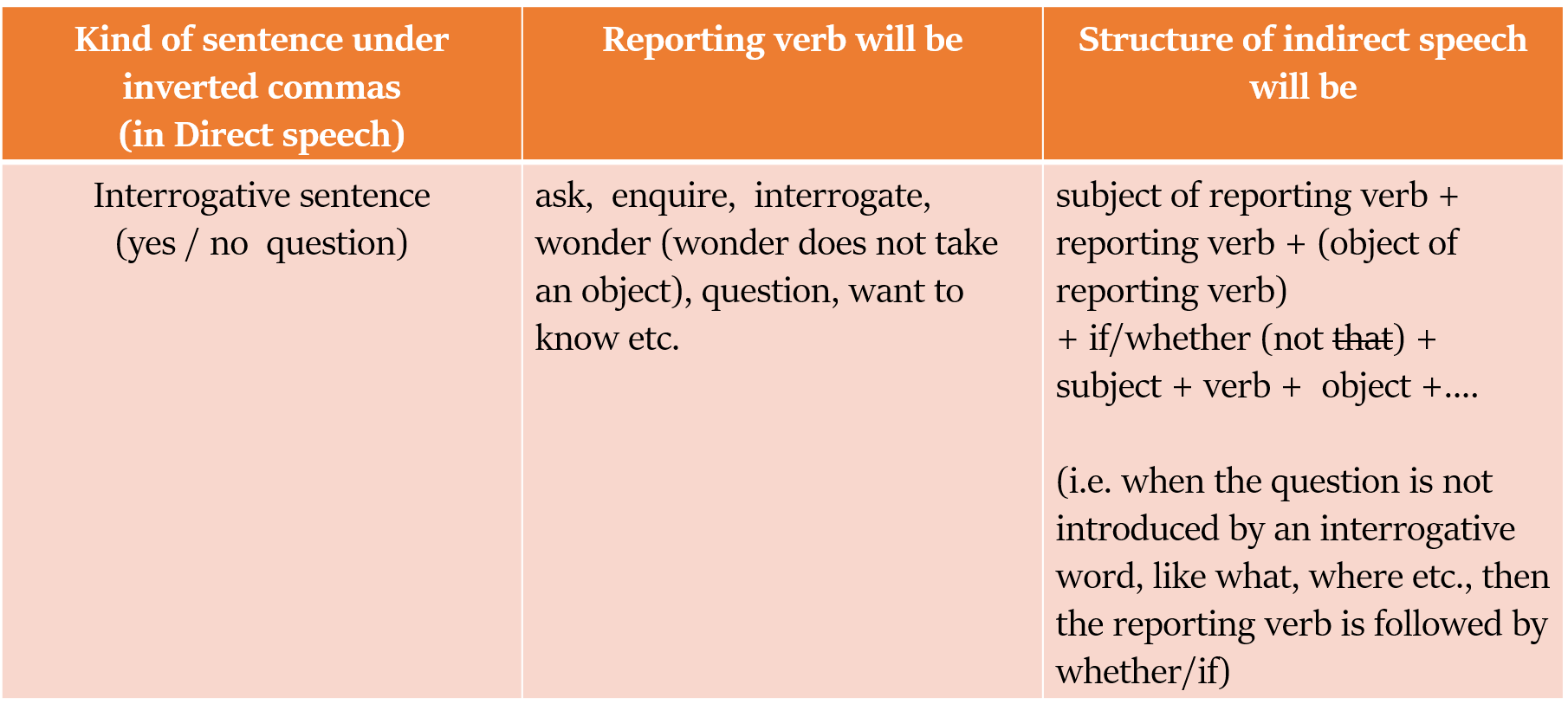Changes in Reporting verb in case of Interrogative sentences
We make any change in the reporting verb and in the sentence structure of direct speech depending on the kind of sentence used under inverted commas.
There may be five kinds of sentences in the inverted commas:
- Assertive
- Interrogative
- Imperative
- Exclamatory
- Optative
In this article, we will cover the transformation in case of Interrogative sentences.
Changing the Reporting verb in Interrogative sentences
Concept 1

Direct speech: He said to me, “Are you lazy?”
Indirect speech: He asked me if I was lazy.
Direct speech: The old man said to me, " I am old, will you bring some water for me?”
Indirect speech: The old man asked me whether I would bring some water for him as he was old.
Concept 2

While transforming direct into indirect, we change the reported speech into assertive sentence.
Direct speech: He said to me, “What is your height?”
Indirect speech: He asked me what my height was.
Direct speech: The doctor said to me, “How and when did you meet with such a fatal accident?”
Indirect speech: The doctor inquired of me that how and when I had met with such a fatal accident. (incorrect; ‘that’ should not be used)
Indirect speech: The doctor inquired of me how and when I had met with such a fatal accident. (correct)
While converting into indirect speech, we should change the ‘Question Mark (?)’ into ‘Full Stop’.
As the sentences are not in interrogative form in indirect speech, so helping verb is used after the subject.
If the question can be answered in yes/no → We will use the conjunction if/whether.
If the question is of ‘wh family’ → We will not use any conjunction.
Concept 3
In case of “Assertive sentence with question tag” remove the question tag and change the assertive sentence into interrogative sentence and follow the required rules.
Fenni said, “you can’t trust everyone, can you?”
Fenni asked if/whether I couldn’t trust everyone. (asked if/whether should be used, instead of ‘said that’)
Concept 4
In case of “yes”, use ‘answer/reply in the affirmative’.
In case of “no”, use ‘answer/reply in the negative’.
He said, “Are you fine?” I said, “yes”.
He asked if/whether I was fine. I replied/answered in the affirmative.
Ajay said to her, “Have you gone mad?” She said, “No”.
Ajay wanted to know from her whether she had gone mad. She replied in the negative.
Concept 5
In case of need and needn’t we use the following structures.
Direct speech: Subject + say/said ……., + “need + Subject + Main verb +……. ?”
Indirect speech: Subject + ask/inquire/……+ if/whether + Subject + had to / have to +
Direct speech: Mak said to Mayank, “Need I go to temple?”
Indirect speech: Mak asked Mayank if he had to go to temple.
Direct speech: Subject + say/said……, “needn’t + Subject + Main verb +…….?”
Indirect speech: Subject + ask/ inquire ………………….. + If/ whether + Subject + needn’t +
Direct speech: Heather said, “Needn’t we meet tomorrow?
Indirect speech: Heather asked if they need not meet the next day.
Concept 6
In case of dare and daren’t we use the following structures.
Direct speech: Subject + say/said….., “Dare + Subject + Main verb …..?”
Indirect speech: Subject + ask/inquire/ …..+ If/ whether + Subject + dare / dared +
Direct speech: Mr. Sharma said to her, “Dare you speak something before your father?”
Indirect speech: Mr. Sharma asked her if she dare speak something to her father.
Direct speech: Subject + say/said………, “Daren’t + Subject + Main verb + ………..?”
Indirect speech: Subject + ask/inquire ……. + if / whether + Subject + daren’t +
Direct speech: Mr. Sharma said, “Daren’t you touch Anand?”
Indirect speech: Mr. Sharma asked if I daren’t touch Anand.
Concept 7
Let us see the structures that we can use in case of “how about/what about +
Indirect speech pattern 1: Subject + suggest/propose +
Direct speech: Alia said, “How about walking on the terrace?”
Indirect speech: Alia suggested walking on the terrace.
Indirect speech pattern 2: Subject + suggest/propose + to + Object + that + we/they + should +
Direct speech: Alia said to Ankita, “what about spending some time together in the gym?
Indirect speech: Alia proposed to Ankita that they should spend some time together in the gym.

Extra Books and Tools
If you prefer to learn via books, or want some good English Grammar books for reference purposes, you may read this article which enlists some of the books recommended by us.